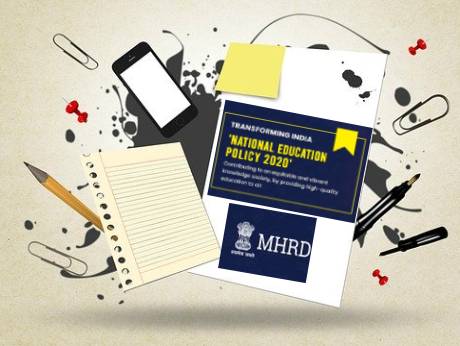
July 30 2020:The Indian government has unveiled the Nationl Education Policy 2020.
This is the first education policy of the 21st century and replaces the thirty-four year old National Policy on Education (NPE), 1986. The policy is aligned to the 2030 Agenda for Sustainable Development and aims to transform India into a vibrant knowledge society and global knowledge superpower by making both school and college education more holistic, flexible, multidisciplinary, suited to 21st century needs and aimed at bringing out the unique capabilities of each student.
Minister of State for the HRD Ministry Sanay Dhotre says that the NEP 2020 is most comprehensive, radical and futuristic policy document in educational history of this country. It does not recognise any barrier in bringing quality and outcome-based education to each and everyone. It now includes children during their most foundational years, that is 3-5 years, for their care and education. Critical thinking, experiential and application-based learning, flexibility in learning, focus on life skills, multidisciplinary, and continuous review are some of the salient features of this policy. Bringing back 20 million out-of-school and drop-out children and universalisation of school education from 3 years onwards reflect on the commitment to the philosophy of 'no one to be left behind'. Academic Bank of Credits, National Research Foundation, and National Mission on Foundational Literacy and Numeracy are some of the landmark policies, which will radically transform our educational ecosystem.
Highlights:
New Policy aims for Universalization of Education from pre-school to secondary level with 100 % GER in school education by 2030
NEP 2020 will bring 2 crore out of school children back into the main stream
New 5+3+3+4 school curriculum with 12 years of schooling and 3 years of Anganwadi/ Pre-schooling
Emphasis on Foundational Literacy and Numeracy, no rigid separation between academic streams, extracurricular, vocational streams in schools ; Vocational Education to start from Class 6 with Internships
Teaching upto at least Grade 5 to be in mother tongue/ regional language
Assessment reforms with 360 degree Holistic Progress Card, tracking Student Progress for achieving Learning Outcomes
GER in higher education to be raised to 50 % by 2035 ; 3.5 crore seats to be added in higher education
Higher Education curriculum to have Flexibility of Subjects
Multiple Entry / Exit to be allowed with appropriate certification
Academic Bank of Credits to be established to facilitate Transfer of Credits
National Research Foundation to be established to foster a strong research culture
Light but Tight Regulation of Higher Education, single regulator with four separate verticals for different functions
Affiliation System to be phased out in 15 years with graded autonomy to colleges
NEP 2020 advocates increased use of technology with equity; National Educational Technology Forum to be created
NEP 2020 emphasizes setting up of Gender Inclusion Fund, Special Education Zones for disadvantaged regions and groups
New Policy promotes Multilingualism in both schools and HEs; National Institute for Pali, Persian and Prakrit , Indian Institute of Translation and Interpretation to be set up
The Union Cabinet chaired by the Prime Minister Narendra Modi approved the National Education Policy 2020 on July 29 2020, making way for large scale, transformational reforms in both school and higher education sectors. This is the first education policy of the 21st century and replaces the thirty-four year old National Policy on Education (NPE), 1986. Built on the foundational pillars of Access, Equity, Quality, Affordability and Accountability, this policy is aligned to the 2030 Agenda for Sustainable Development and aims to transform India into a vibrant knowledge society and global knowledge superpower by making both school and college education more holistic, flexible, multidisciplinary, suited to 21st century needs and aimed at bringing out the unique capabilities of each student.
Unprecedented Consultations
NEP 2020 has been formulated after an unprecedented process of consultation that involved nearly over 2 lakh suggestions from 2.5 lakhs Gram Panchayats, 6600 Blocks, 6000 ULBs, 676 Districts. The MHRD initiated an unprecedented collaborative, inclusive, and highly participatory consultation process from January 2015. In May 2016, ‘Committee for Evolution of the New Education Policy’ under the Chairmanship of Late T.S.R. Subramanian, Former Cabinet Secretary, submitted its report. Based on this, the Ministry prepared ‘Some Inputs for the Draft National Education Policy, 2016’. In June 2017 a ‘Committee for the Draft National Education Policy’ was constituted under the Chairmanship of eminent scientist, Dr. K. Kasturirangan, which submitted the Draft National Education Policy, 2019 to the Hon’ble Human Resource Development Minister on 31st May, 2019. The Draft National Education Policy 2019 was uploaded on MHRD’s website and at ‘MyGov Innovate’ portal eliciting views/suggestions/comments of stakeholders, including public.
Click here for the detailed information Posted On: 29 JUL 2020 5:20PM by PIB Delhi